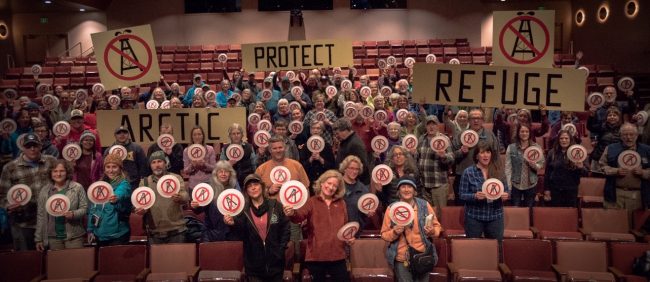The Trump administration has launched the process to lease the coastal plain of the Arctic National Wildlife Refuge for oil drilling. In April, the Department of Interior’s Bureau of Land Management (BLM) initiated the first step in that process with an environmental review which is preceded by a public comment period which is open until June 19th.
Click here to sign on to our petition demanding the suspension of this ill-conceived scheme or submit your individual comments regarding drilling in the Arctic Refuge to the BLM by clicking here. (the comment link is on the right hand side of the page under “Submit Scoping Comments” please submit comments on the Notice of Intent)
Read the Notice of Intent here.
Suggested Arctic National Wildlife Refuge Talking/Commenting Points from the Wilderness Society
- The Arctic Refuge is an amazing wilderness area that provides essential resources for the Gwichi’in and other Alaska Natives, and recreation opportunities for the general public.
- The Arctic Refuge is one of the country’s most treasured and beautiful landscapes which should not be destroyed by oil and gas development.
- The coastal plain is extremely important and globally significant habitat for caribou, migratory bird breeding, wolves, and denning polar bears, as well as other Arctic and Alaskan species.
- Oil and gas drilling would have devastating impacts on this fragile coastal ecosystem due to the massive and polluting infrastructure needed to explore, produce and transport the oil. This includes sprawling roads, pipelines, drill pads, worker facilities and other infrastructure.
- Oil drilling infrastructure likely will sprawl over vast stretches of the narrow coastal plain, adversely impacting wildlife and subsistence. Caribou females with calves often avoid infrastructure, and the narrow coastal plain of the Arctic Refuge may limit their ability to shift away from infrastructure like they can do in wider areas near Prudhoe Bay.
- Oil production will produce greenhouse gases and black carbon which will further harm the Arctic, an area currently warming at twice the rate of most other parts of the planet.
- The new oil and gas development purpose of the Arctic Refuge conflicts with the other purposes of the refuge. Oil and gas development will degrade subsistence resources and access to those resources including wildlife, plants, water, and air quality, among others.
- The Fish and Wildlife Service in 2015, after an extensive analysis, recommended wilderness protection for the coastal plain to Congress.
- The U.S. and Canada have a 1987 treaty to protect the Porcupine Caribou Herd and that treaty’s obligations must be honored. The BLM needs to coordinate with the Canadian government and indigenous nations on this treaty’s requirements.
- The Environmental Impact Statement must not be rushed. Procedural and scientific integrity, not political expediency, should drive the timeline. The EIS must utilize best available scientific information and traditional and local knowledge, and obtain data to fill baseline data gaps.
- Given the major impacts a lease sale(s) will have on wildlife, the Gwich’in people, and others with connections to the Arctic Refuge – in combination with the lack of public debate on the tax law – we request a 60 day extension to the comment period.
